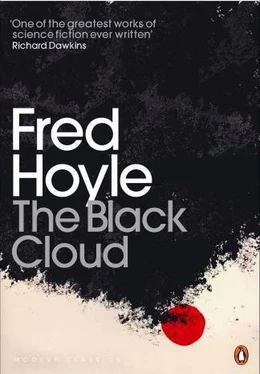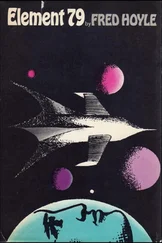Fred Hoyle - The Black Cloud
Здесь есть возможность читать онлайн «Fred Hoyle - The Black Cloud» весь текст электронной книги совершенно бесплатно (целиком полную версию без сокращений). В некоторых случаях можно слушать аудио, скачать через торрент в формате fb2 и присутствует краткое содержание. Жанр: Фантастика и фэнтези, на английском языке. Описание произведения, (предисловие) а так же отзывы посетителей доступны на портале библиотеки ЛибКат.
- Название:The Black Cloud
- Автор:
- Жанр:
- Год:неизвестен
- ISBN:нет данных
- Рейтинг книги:5 / 5. Голосов: 1
-
Избранное:Добавить в избранное
- Отзывы:
-
Ваша оценка:
- 100
- 1
- 2
- 3
- 4
- 5
The Black Cloud: краткое содержание, описание и аннотация
Предлагаем к чтению аннотацию, описание, краткое содержание или предисловие (зависит от того, что написал сам автор книги «The Black Cloud»). Если вы не нашли необходимую информацию о книге — напишите в комментариях, мы постараемся отыскать её.
The Black Cloud — читать онлайн бесплатно полную книгу (весь текст) целиком
Ниже представлен текст книги, разбитый по страницам. Система сохранения места последней прочитанной страницы, позволяет с удобством читать онлайн бесплатно книгу «The Black Cloud», без необходимости каждый раз заново искать на чём Вы остановились. Поставьте закладку, и сможете в любой момент перейти на страницу, на которой закончили чтение.
Интервал:
Закладка:
“None that I could swear to.”
“Then surely that’s pretty good evidence that the Cloud is coming dead towards us, or at any rate dead towards the Sun.”
“You might say so, but I can’t be certain.”
“So what you mean is that the Cloud is probably going to hit us, but there’s still a chance that it might not.”
“I still think you’re being unduly pessimistic. We’ll just have to see what we can learn during the next month or two. And anyway, even if the Sun is blotted out, don’t you think we can see it through? After all it’ll only be for about a month.”
“Well, let’s go into it from scratch,” began Kingsley. “After a normal sunset the temperature goes down. But the decline is limited by two effects. One is the heat stored in the atmosphere, which acts as a reservoir that keeps us warm. But I reckon that this reservoir would soon become exhausted, I calculate, in less than a week. You’ve only got to think how cold it gets at night out here in the desert.”
“How do you square that with the Arctic night, when the Sun may be invisible for a month or more? I suppose the point is that the Arctic is constantly receiving air from lower latitudes; and that this air has been heated by the Sun.”
“Of course. The Arctic is constantly warmed by air that flows up from tropical and temperate regions.”
“What was your other point?”
“Well, the water vapour in the atmosphere tends to hold in the heat of the Earth. In the desert, where there’s very little water vapour, the temperature goes down a long way at night. But in places where there’s lots of humidity, like New York in summer, there’s very little cooling at night.”
“And what does that lead you to?”
“You can see what will happen,” continued Kingsley. “For the first day or two after the Sun is hidden — if it is shut out, that’s to say — there won’t be a great deal of cooling, partly because the air will be still warm and partly because of the water vapour. But as the air cools the water will gradually turn, first into rain, then into snow, which will fall to the ground. So the water vapour will be removed from the air. It may take four or five days for that to happen, perhaps even a week or ten days. But then the temperature will go racing down. Within a fortnight we shall have a hundred degrees of frost, and within a month there’ll be two hundred and fifty or more.”
“You mean it’ll be as bad here as it is on the Moon?”
“Yes, we know that at sunset on the Moon the temperature declines by over three hundred degrees in a single hour. Well, it’ll be much the same here except that it’ll take longer because of our atmosphere. But it’ll come to the same thing in the end. No, Marlowe, I don’t think we can last out a month, even though it doesn’t seem very long.”
“You reject the possibility that we might keep warm the same way as they keep warm in winter in the Canadian prairies, by efficient central heating?”
“It’s just possible I suppose that some buildings are sufficiently well insulated to stand the tremendous temperature gradients that’ll be set up. They’ll have to be very exceptional, because when we build offices and houses, and so on, we don’t build with these temperature conditions in mind. Still I’ll grant you that a few people may survive, people that have specially well designed buildings in cold climates. But I think there’s no chance at all for anyone else. The tropical peoples with their ramshackle houses will be in a very poor case.”
“Sounds very grim, doesn’t it?”
“I suppose the best thing will be to find a cave where we can get deep underground.”
“But we need air to breathe. What should we do when that gets very cold?”
“Have a heating plant. That wouldn’t be too difficult. Heat the air going into a deep cave. That’s what all the Governments that Herrick and the A.R. are so keen on will do. They’ll have nice warm caves, while you and me, Marlowe my boy, will get the icicle treatment.”
“I don’t believe they’re quite as bad as that,” Marlowe laughed.
Kingsley went on quite seriously:
“Oh, I agree they won’t be blatant about it. There’ll be good reasons for everything they do. When it becomes clear that only a tiny nucleus of people can be saved, then it’ll be argued that the lucky fellows must be those who are most important to society; and that, when it’s boiled down and distilled, will turn out to mean the political fraternity, field-marshals, kings, archbishops, and so on. Who are more important than these?”
Marlowe saw that he had better change the subject slightly.
“Let’s forget about humans for the time being. How about other animals and plants?”
“All growing plants will be killed, of course. But plant seeds will probably be all right. They can stand intense cold and still be capable of germination as soon as normal temperatures return. There’ll probably be sufficient seeds around to ensure that the flora of the planet remains essentially undamaged. The case is very different with the animals. I don’t see any large land animal surviving at all, except a small number of men, and perhaps a few animals that men take into shelter with them. Small furry burrowing animals may be able to get deep enough into the ground to withstand the cold, and by hibernating they may save themselves from dying for lack of food.
“Sea animals will be very much better off. Just as the atmosphere is a reservoir of heat, the sea is a vastly greater reservoir. The temperature of the seas won’t fall very much at all, so the fish will probably be all right.”
“Now isn’t there a fallacy in your whole argument?’ exclaimed Marlowe with considerable excitement. “If the seas stay warm, then the air over the seas will stay warm. So that there’ll always be a supply of warm air to replenish the cold air over the land!”
“I don’t agree there,” answered Kingsley. “It isn’t even certain that the air over the seas will stay warm. The seas will cool enough for them to freeze up at the surface although the water lower down will stay quite warm. And once the seas freeze over, there won’t be much difference between the air over the land and the sea. It’ll all get extremely cold.”
“Unfortunately what you say sounds right. So it looks as if a submarine might be the right place to be!”
“Well, a sub wouldn’t be able to surface because of the ice, so a complete air supply would be needed and that wouldn’t be easy. Ships wouldn’t be any good either because of the ice. And there’s another objection to your argument. Even if the air over the sea did stay comparatively warm, it would not supply heat to the air over the land, which being cold and dense would form tremendous stable anticyclones. The cold air would stay on the land and the warm air on the sea.”
“Look here, Kingsley,” laughed Marlowe, “I’m not going to have my optimism damped by your pessimism. Have you thought of this point? There may be quite an appreciable radiation temperature inside the Cloud itself. The Cloud may have an appreciable heat of its own, and this might compensate us for the loss of sunlight, always supposing — as I keep saying — that we do find ourselves inside the Cloud!”
“But I thought the temperature inside the interstellar clouds was always very low indeed?”
“That’s the usual sort of cloud, but this one is so much denser and smaller that its temperature may be anything at all, so far as we know. Of course it can’t be extremely high, otherwise the Cloud would be shining bright, but it can be high enough to give us all the heat we want.”
“Optimist, did you say? Then what’s to stop the Cloud being so hot that it boils us up? I didn’t realize there was so much uncertainty about the temperature. Frankly, I like this possibility even less. It’ll be completely disastrous if the Cloud is too hot.”
Читать дальшеИнтервал:
Закладка:
Похожие книги на «The Black Cloud»
Представляем Вашему вниманию похожие книги на «The Black Cloud» списком для выбора. Мы отобрали схожую по названию и смыслу литературу в надежде предоставить читателям больше вариантов отыскать новые, интересные, ещё непрочитанные произведения.
Обсуждение, отзывы о книге «The Black Cloud» и просто собственные мнения читателей. Оставьте ваши комментарии, напишите, что Вы думаете о произведении, его смысле или главных героях. Укажите что конкретно понравилось, а что нет, и почему Вы так считаете.












